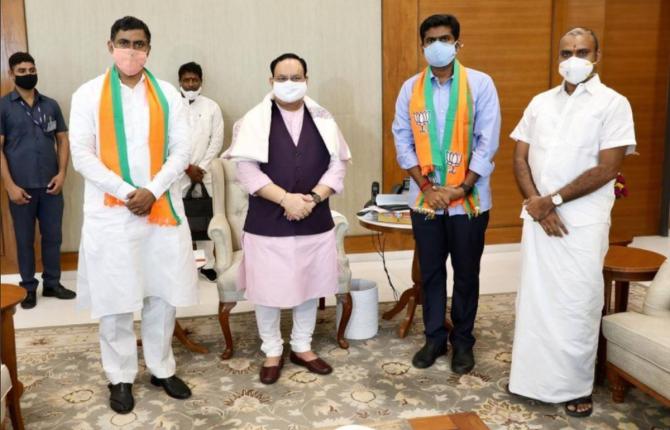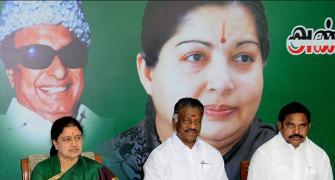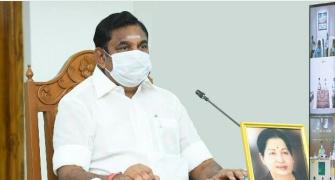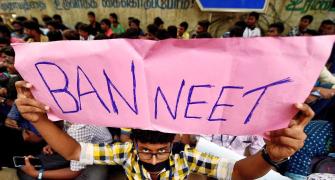For a party that has adopted the successful social re-engineering model from Gujarat, Rajasthan and across the rest of the ‘Hindi belt’ over the past decades, Tamil Nadu continues to remain a tricky customer, says N Sathiya Moorthy.

In a double whammy for the Bharatiya Janata Party in southern Tamil Nadu, the Supreme Court has upheld the three per cent ‘reservations within reservations’ granted to the Arundathiyar sub-sect within the larger Scheduled Castes, granted by the then Dravida Munnetra Kazhagam state government in 2009, even as Chief Minister Edappadi K Palaniswami has declared that his All India Anna DMK would be leading the alliance in next year’s assembly election.
The two issues assume significance for the state BJP ahead of the assembly polls, as only recently the party began promoting the Arudathiyar sub-sect as a prospective vote-bank, with some leaders also claiming that they would lead the electoral combine (implying that the AIADMK would work with/under them).
The Arundathiyar sub-quota issue did not help the then ruling DMK win the 2011 assembly elections, especially after the 2G scam hit national headlines and received international attention. Yet, a new traction began when the BJP, after much delay, appointed L Murugan, from the Arundathiyar community, as the state unit chief, despite his lack of exposure even in TN party circles.
It became a talking point, though, only after Murugan effected the cross-over of fellow Arundathiyar and DMK veteran, V P Duraisswamy, also from native Namakkal, and made him a state BJP vice president in recent weeks.
Suddenly now, the state BJP is finding out that the SC verdict has revived forgotten memories, if any, of the Karunanidhi initiative. This, in turn, was aimed at improving the DMK’s chances in the AIADMK-dominated western region -- but did not work at the time.
The BJP’s initiative in appointing Murugan made the ‘Arundathiyar issue’, if not the ‘internal reservations’, a talking point for sections of the state media, especially social media. Murugan facilitating Duraiswami’s defection, followed by his instant elevation, all put a greater focus on the subject. Now, the SC verdict, overnight, has reversed the focus onto the DMK, Karunanidhi’s chief ministership and his ‘quota within quota’ scheme which did not, however, find favour with a section of the state bureaucracy.
According to the dissenters, SC-ST reservations having been mandated by the Constitution at birth, any modification could be effected only by Parliament -- or, at least by Parliament endorsing a state government decision. Now, though mainly in connection with a Punjab case, a five-Judge Constitution Bench has indicated that the ‘creamy layer’ provision, enunciated by the court in the ‘Mandal case’ (Indra Sawhney vs Union of India, 1992) should be applicable to the SC reservations also.
After seemingly strenuous homework over the past several years, after keeping the post vacant for months following the ‘elevation’ of incumbent Tamizhisai Soundararajan as Telangana governor, the BJP carefully named an Arundathiyar in L Murugan as the state party chief earlier this year. There was no denying the backwardness of the sub-sect among various Dalit sects in the state, despite their relatively substantial numbers.
In turn, DMK’s V P Duraiswamy, another Arundathiyar with roots in western Namakkal town, became the first target for Murugan for being inducted into the party, and as a state vice president. Even the caste and sub-caste equations became a talking matter outside of party circles, not when Murugan was named TN unit chief but only when Duraiswamy crossed over. It also owes to the kind of support base the media perceives the BJP has, or does not have in the state -- and the kind of stirrings a second-line DMK leader’s defection may impact on the latter.
Needless to recall, the Duraiswamy defection has since been followed by a DMK legislator, Ku Ka Selvam, joining the BJP. Sections of the social media have begun adding one or the other of senior DMK leaders, including former state and central ministers, and also incumbent MLAs and MPs, but that phase has died down, at least for now.
In between, the real problem for the BJP at the grassroots-level came to be felt in the traditionally communally-sensitive southern Tirunelveli, where some ‘caste Hindu’ leaders are reportedly considering putting in their papers, to protest against the appointment of a Dalit as district party secretary. According to reports, they have since handed over their resignations to Nainar Nagendran, who was a senior leader in the ruling AIADMK when Jayalalithaa was around, and is reportedly upset over his continued retention as one of the many state party vice presidents.
That way, free distribution of party posts to newcomers is creating heartburn among long-standing members. The conferment of state party vice presidency on K Annamalai, a young IPS officer from Tamil Nadu who quit the service as a Karnataka cadre officer and later joined the party, has not gone down well with old loyalists. It came out clear when state party secretary K T Raghavan had to end up defending Annamalai’s posting to the media.
“When important people join the party, we need to honour them. That has not created any rift or heartburn in our old-time loyalists,” Raghavan said. However, camp followers like those of Tirunelveli’s Nainar Nagendran, for instance, quip if equating their man, a electoral and political veteran and a greenhorn, is one and the same. They had expected Nagendran to be named the state unit chief. A month ago, Murugan visited the other in his Tirunelveli residence, after rumours began doing the rounds that he was crossing over to the DMK.
Annamalai’s induction has created another minor ripple for the BJP, as fans of superstar Rajinikanth are upset with the other two. According to them, after Rajinikanth declared that he would identify a honest, qualified person as his promised party’s chief minister candidate, Annamalai is reported to have claimed that he was ‘Rajini’s choice’. Now for the BJP to woo him to its side and still expect Rajinikanth to bless the party and his fans to work for the party is not on, say many fans of the superstar.
For a party that has adopted the successful social re-engineering model from Gujarat, Rajasthan and across the rest of the ‘Hindi belt’ over the past decades, Tamil Nadu continues to remain a tricky customer. The party was able to make huge inroads into southern Kanyakumari district, which continues to be a stronghold of the Congress rival at the national level.
The unexpected death of H Vasanthakumar, incumbent Congress member of the Lok Sabha, due to Covid related complications, has led to a by-election. It is likely that the it will be conducted along with the state assembly elections. While the BJP has a substantial support base in the constituency, the party should still be worried about the whopping 2.61-lakh vote margin of Vasanthakumar over the BJP’s incumbent MP, Pon Radhakrishnan, in 2019.
It is unclear as yet if the swing away from the BJP and Radhakrishnan owed to the traditional BJP voter’s antipathy to the party or the candidate -- or, to the relative popularity of Vasanthakumar even among traditional BJP voters, what with the Congress vote-share remaining constant. But jockeying for BJP nomination is already on within the district party, and also within the Congress rival, where even local chieftains of alliance leader DMK are talking about the party taking back the seta from the partner in the by-election.
For a section of the state BJP, which had hoped to use the alliance leadership card as a bargaining chip vis a vis the ruling AIADMK for the assembly polls, Chief Minister EPS’s declaration that his party alone would lead the alliance, has come as a premature shocker. BJP stalwarts were ready to concede that in the final round, only the AIADMK would get to lead the electoral combine, but they had hoped to use the card as a bargaining chip for seats negotiations. That is now not to be.
The AIADMK, on the other hand, is keen to find out if the very idea was created by someone in the state BJP or by some party strategist at New Delhi, or at least had the blessings of the top two, namely Prime Minister Narendra Modi and Home Minister Amit Shah. In turn, it implies that the AIADMK too would be preparing to drive a hard bargain in terms of number of seats ad also in the identification of constituencies.
More importantly, the AIADMK will have to take stock of the cadre mood on aligning with the BJP in the first place, as there is a strong sentiment in the party that the LS poll washout last year owed to identifying (too much) with the saffron party. A similar but opposite feeling is there also in the state BJP, where cadres cite Modi’s magic sweeping the rest of the country but losing so very badly in the state ‘only because of association with the corrupt AIADMK’.
Their idea is that the BJP should still contest all future elections on its own, as in neighbouring Kerala, and wait for the party’s turn -- without compromising on the party’s ‘clean image’ among traditional voters. “After all,” they say, “We are not going to come anywhere close to forming a government in the state, nor can we afford to underwrite the corrupt ways of the AIADMK if the alliance won and we insist on power-sharing.”
Whatever it be, state BJP leaders should be happy for one thing… For weeks now, and possibly all the way up to the assembly polls, the party is going to be in big-time news, every now and again. It will be even more so if either there are further high-profile defections engineered from other parties, or there are protests from within the ranks about ignoring their legitimate claims over the exigencies of electoral politics, a la its Congress rival from the past.
N Sathiya Moorthy, veteran journalist and political analyst, is Distinguished Fellow and Head-Chennai Initiative, Observer Research Foundation.









